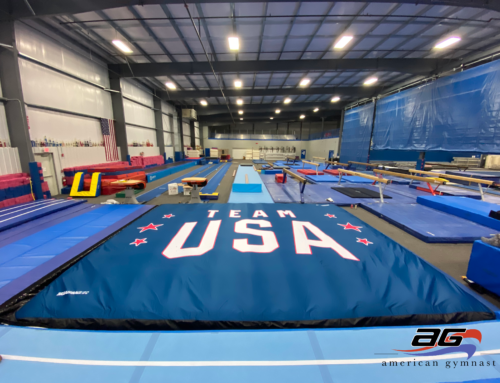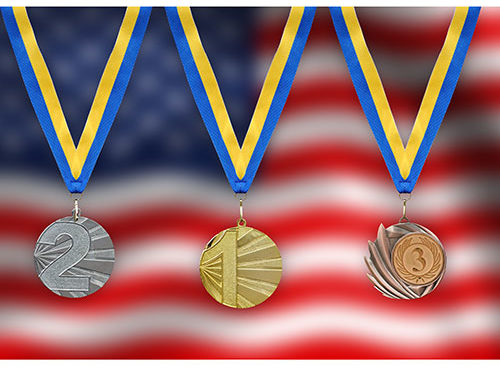How do we look for the “non-physical” qualities in a young gymnast?
I’ve already discussed how I test for those seven physical qualities that I consider most important to look for in a budding young gymnast. Now I wanted to go into more depth about how I look for the seven non-physical qualities I mentioned on my list. As you’ll see, these qualities aren’t necessarily ones we can easily “quantify” or test, but they are just as important (if not more important) to look for. I want to emphasize that I never encourage writing a child off simply because of a deficit in one or more of these areas. Remember that NO child is going to have all 14 qualities at optimal levels, and some may in fact be seriously lacking in some. The most important thing I want to accomplish by bringing up these points is to remind us as coaches to consider each of these qualities and begin to PLAN how to help our athletes grow and develop in the areas in which they are lacking. Every single child is going to be a unique “jigsaw puzzle” that will need to be molded and guided very differently. Being very vigilant for each of these attributes when a child is very young can help us become the best possible coach we can be for that individual athlete. Let’s not forget that we, as coaches, all have our own strengths and weaknesses as well!
Non-Physical Qualities
1. Motivation/enthusiasm: This is pretty easy to pick up on. Does the kid seem like he is there to please his mom, or has he been begging his mom to try out for the team? Does the kid’s mind seem to be somewhere else, or is he so wide-eyed and enthralled that everything you do grasps his attention? Does the kid seem lazy and/or fatigued, or is he energetic and quick to try anything you ask him?
2. Intelligence: I’ve been amazed at the correlation between a kid’s intelligence and his gymnastics ability. I’ve determined that a big part of intelligence involves an intact “mind-body” connection, which is obviously essential in gymnastics. Does the kid seem to understand when you ask him to straighten his legs, squeeze his feet together, and point his toes? Is he able to follow your directions while learning a cartwheel, or can he simply not figure out how to place his hands down and kick his feet over no matter how many times you try? Can he answer questions you ask him in a normal fashion for his age, or does he look at you very confused and respond slowly even after simple commands? Interestingly, I’ve found that physically “coordinated” kids tend to be intelligent much more often than not.
3. Listening skills: I consider “listening” in a different category than “behavior.” Listening refers to how well a kid pays attention to what you’re saying, makes eye contact with you while you’re speaking, and follows through with what you ask of him or her. Notice whether the kid’s eyes wander constantly while you’re speaking and whether or not he/she is even attempting to do what you’re asking. Note, however, that many talented kids (at least on the boys’ side) often DO have a lot of trouble paying attention. In fact, I’ve often found that many of the MOST talented boys tend to have ADHD or at least some attention deficits. I can’t explain why, but the point is that you shouldn’t necessarily rule out a kid from competitive gymnastics based on this quality alone. If the kid doesn’t have enough other qualities to make up for it, though, you may want to think twice about throwing him into a group of kids you’re trying to coach seriously.
4. Behavioral skills: Pretty self-explanatory…but again, similar to listening skills, behavioral skills in some of the most talented kids CAN be lacking. It may require some creative thinking and lots of structured positive reinforcement to help keep some boys in line. It’s important to be patient and give every chance you can to kids who you believe have potential, but also ask yourself, “Will this kid be ADDING more to my team or TAKING AWAY more?”
5. Courage: Fear is definitely a natural part of gymnastics, and we’ve all seen kids at both ends of the spectrum. I’ve certainly found though, that the part of a kid’s personality that relates to fear vs. courage is evident very early on. I’ve found that kids who remain frozen by a mother’s side and cry hysterically upon separation in the preschool years tend to display issues with confidence and boldness as adolescents and teenagers. The same kids who are terrified to jump into a pit at age 3 or 4 are often the same ones terrified to do a back handspring at age 7 or 8. The same kids scared to walk across a beam even while holding your hand are often the same ones afraid of the high beam or the high bar later on. It’s very important to develop ways of dealing with fears as a coach, but also keep in mind that courage with heights and being upside down is essential in gymnastics, and often becomes a limiting factor beyond the earliest levels. I rarely EXCLUDE a kid from being invited to the competitive team based on fear alone, but I have definitely found that boldness at an early age seems to translate into confidence and courage at a later age…very important qualities in a gymnast.
6. Trust of the coach: I think this quality is perhaps a bit underrated and underappreciated in a young gymnast. Like the other non-physical qualities in this list, “trust” isn’t something we can quantify, but we sure know when it’s there. Although it certainly can be related to fear in general, I consider these two qualities separate because they can exist in isolation of each other. A gymnast can be prone to fear but still trust the coach to spot him/her or tell him/her when he/she is ready to perform a skill. Have you ever had a kid who is scared of a skills and doesn’t seem to treat the skill any differently whether you are spotting him or not? Have you ever had kids who, no matter how often you feel you have proven that you know their capabilities and will never rush them into a skill, they still lack confidence to do what you ask them to do? Or how about a kid who has so much ability but is simply very stubborn about committing to your corrections and believing that what you say will make him/her better? These kids lack TRUST. Sometimes they may be fearful, and sometimes they may not. I believe trust is one of the qualities that determines how “coachable” an athlete is, which directly translates into how much progress you can make with him/her. Trust can be sensed at an early age by how well a child seems to be comforted by you spotting him/her, how well he or she makes simple corrections you ask of him/her, and even how much eye contact he or she makes with you when you speak to him/her.
7. Emotional stability: We all know how much emotions can play into gymnastics. The incredible demands gymnastics places on our bodies, our minds, our time, our focus, and our energy – combined with the almost obsessive level of perfectionism required to succeed – brings out emotions that many of us didn’t even know we had. This sport possibly has the potential to draw more tears than just about any other sport out there, but I believe it also has the potential to be the most rewarding and exhilarating sport as well. Attitude can be EVERYTHING in gymnastics, and the perspectives and emotional tendencies of children can be just as diverse as their physical attributes. I’ve found these tendencies to be incredibly stable over time (for better or for worse…), and thus a child’s attitude and “emotional stability” can be evident very early on. We have an incredible opportunity and responsibility as coaches to help guide a kid’s attitude and emotional tendencies in the right direction. Finding the positive perspective and displaying our own patience and emotional stability as coaches can, over time, have profound impacts on a child’s attitude, happiness, and success both in the gym and out of the gym. Always keep in mind that kids with tendencies toward negativity and emotional outbursts will require MUCH more attention and MUCH more patience. Some may have issues so profound that competitive gymnastics may not be appropriate, but others may just need a little extra TLC. Consider a child’s attitude and emotional stability to be a piece of the overall puzzle, but keep a positive attitude yourself about how to deal with it. It can be one of the most challenging, but also most rewarding, ways to impact a child’s life.
Any particular things you have come to look for as coach in a young athlete? What non-physical qualities tend to worry you or excite you the most?



Leave A Comment